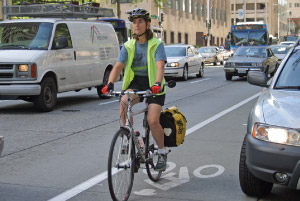“Organic” transportation? How your choices can impact our planet
by John Williams
This article was originally published in September 2006

(September 2006) — As a PCC member, you’re already aware that the choices you make as a consumer have a powerful impact on the world around you. Thanks to people like you, organic food has gone from a niche option to mainstream. This has benefited the entire ecosystem: soil, air and water.
Now it’s time for us to transform our transportation habits. Global warming poses a major threat. Yet the issue seems so overwhelming that many people feel powerless to make a difference. They may assume the solution requires massive investments in new energy sources or advanced technology. Or they trust that “someone else” will find a way to reverse the impact on our atmosphere.
The truth is that a single person can make a difference. The “difference” may be the result of individual efforts by people such as you and me, our family members, co-workers and neighbors. Just as consumer behavior transformed the organic food industry, we can transform our transportation habits.
There’s no doubt it’s often easier to hop in a car to get to work, run an errand or shop at PCC. But these trips cost more than $3 per gallon of gas. The biggest contributor to many of our environmental issues can be tied to our reliance on the personal automobile for our transportation needs.
More and more people are taking matters into their own hands. They’re finding that Metro is a better way to commute to work. They’re walking or biking to do short errands. They’re combining errands into one single trip. One thing they all have in common is a belief that even the little things can add up to make a big impact. They’re probably a lot like you.
Take Linda Schwartz, a program manager at Public Health, Seattle & King County, who with her partner, commutes 13 miles a day on her bike. “Bike commuting is a central part of my lifestyle. My partner and I walk as much as we can — for shopping, dining and movies. We really only use our car to get us to the great outdoors.”
Or Brian Williams, a group product manager at Amazon.com, who recently began riding Metro to work. With an employer-sponsored FlexPass, Williams decided he at least should give it a try. “I’ve found that it’s only a few minutes longer on the bus, and I get to read the paper, catch up on work documents, or just relax.”
Eunice Letzing, a program consultant with The Seattle Foundation and her husband, Gerhard, executive director of the Washington State Trial Lawyers Association, are a one-car household. Gerhard, who was raised in Europe, rides Metro to his office daily, and Eunice, who works from home, uses the car for meetings. They use the car on weekends mainly to travel outside the area. Eunice believes their transportation choices mirror their values, and offers this advice for others.
“If you love this region, you need to do whatever you can. But besides the obvious environmental benefits, don’t overlook the economic benefits. It just makes good sense all the way around.”
What these people all have in common is that they’ve made a conscious effort to reduce the amount they drive their cars. Some have made wholesale changes in their lifestyle, others have taken small steps.
The fact is, every trip counts. So the next time you’re shopping at PCC and feeling good about your organic choices, consider going one step further for the environment — spend less time in your car. You can make a difference.
John Williams works on transportation issues with King County Metro Transit and Flexcar in Seattle.
